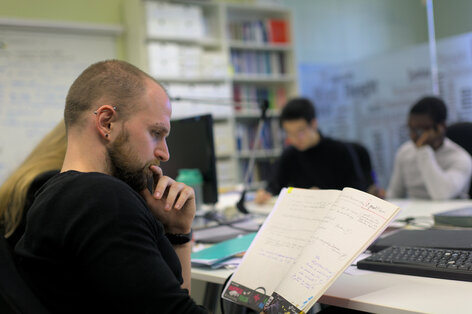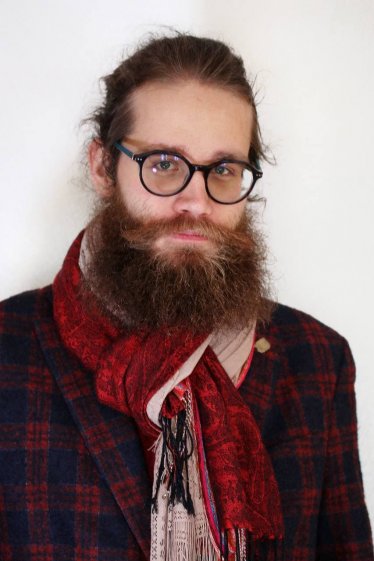Why study philosophy in Tartu?
Is the increasing polarization of modern society the product of rational thinking? To what extent should science be led by citizens? Do vaccine passports discriminate against the unvaccinated? How does state-funded communal memory (e.g. of public statues) shape our understanding of what’s acceptable in society? These are philosophical questions whose answers have a direct bearing on how we should proceed in meeting the challenges of our age. Our ability to properly answer these questions depends on our ability to find defensible answers to other more foundational philosophical questions like: What is it to be rational? What is objectivity? Can moral claims like “vaccine mandates are unjust” be true just like, say, claims about atoms or the geographical location of St Petersburg?
When you join the University of Tartu Department of Philosophy, you’ll be joining a highly ranked department (within the top 200 philosophy departments in the world according to the QS University Rankings) whose researchers work to address important philosophical questions of these various sorts using the tools of philosophical inquiry. The Department invites candidates (both those with a background in philosophy and those with a background in another discipline) to train in the use of these tools and to acquire knowledge of the contemporary debates currently unfolding between theorists on these and related matters.

A student admitted to our programme develops these skills and this knowledge by pursuing an amalgamation of study and supervised-research that they have tailored both to their own background and to where they want to use these skills after graduating. Graduates of our programme go on to work in organizations that require the skills our programme trains such as start-ups, think tanks, non-governmental organizations and research universities.
An MA degree is a small but important step on the path to becoming a philosopher. To become a philosopher, it's not enough to read books and attend lectures. One has to immerse oneself deeply in philosophical problems and learn the art of thinking. The Tartu Philosophy MA program provides the best support in the region for this kind of individual development. If you enter our program, together with your supervisor you will design your own study plan, tailored to your individual needs. You will receive research experience and extensive individual tutoring. You have the chance to take that decisive step towards becoming a philosopher.
What will you get from studying philosophy in Tartu?
Knowledge of the philosophical foundations underlying the challenges of our age. Students will learn how to adopt a defensible position on the issues underlying and shaping our views of what’s possible and why, and of what’s acceptable and why. And they will learn how to trace-out the implications of these foundations for these challenges.
Real “hands-on” research experience. Thanks to both individual supervision and research-driven courses and seminars, every student can be involved in a number of research activities with our staff.
Transferable skills. The MA in Philosophy at Tartu trains: clear argumentative writing i.e. writing which defends an assessment of a clearly defined thesis using reason and argument; the ability to break down the process of solving an abstract problem into more easily solvable parts; clear, civil and constructive communication with people you disagree with; the ability to translate (in writing and in verbal presentations) ideas, theories, and explanations between different disciplines (e.g. psychology, philosophy, politics, and law).
Value-for-money. Our researchers engage in cutting edge research published in high-quality venues, are dedicated teachers who have won awards for their classes, and are keen to work with you. Yet the cost of our MA is far lower than that found in other countries and the cost of living in Tartu makes our degree an especially affordable option. Some fee-waivers and scholarships are also available.
An international environment. The department has international staff (both non-Estonians and Estonians who were trained at philosophy departments from across the world). Many members of our department belong to international networks of researchers working in their sub-field (e.g. the Natural Law 1625-1850 project, the Nietzsche International Lab (NIL) in Lisbon, the European Society for Philosophy of Medicine and Healthcare, the "Language in the Machine Era" network). These bring visiting scholars and international workshops to the department. The department hosts the prestigious Frege lectures—which brings world-renowned philosophers to Tartu for a week of seminars, lectures and social events each year. Our own MA students typically organize their own graduate conference each year, which draws in graduate students from across the world.
Alumni speaks -

|
What is the curriculum like?
The setup of the MA program in Tartu is designed to allow students with different levels of expertise in philosophy to follow tailor-made, fulfilling and productive study plans. The curriculum structure enables flexible research-based studies for those who have studied philosophy before and would like to focus on a specific area and get more involved in research. The curriculum is equally suitable for those who are just beginning to study philosophy and would like to attend more general philosophy classes.
The official details of the program can be found here. Here below is an informative description.
Common Subjects (18 ECTS) consist of two courses. The MA Seminar (12 ECTS) runs through each of the four semesters, and is devoted first to sessions focussing on general and specifically philosophical skills (looking for research material, writing papers, writing applications etc.), then to presenting your own work in progress, with feedback given by peers and seminar conductor. The Research Seminar (6 ECTS) is held in the first semester, and will introduce youto current research directions in the department, with seminars held by different members of staff.
The Specialisation Module (48 ECTS) is in many ways the learning core of your studies. It is divided into three subsequent blocks (16 ECTS each block). Each block is a package to be filled in the student’s own preferred way, according to both interests and needs, and with the guidance and agreement of your supervisor. Each block will typically include a mix of
(a) ordinary courses relevant to the student’s research interests, chosen from the offer in our Department as well as from other Departments (see forthcoming philosophy classes here, a list of recent courses here, and forthcoming courses in English for the whole university here), and
(b) individual work with one’s supervisor or other members of staff (focussed readings, tutorials, writing practice etc.), for an amount of ECTS as deemed feasible by the two parties, but not more than 16 ECTS total for each block. Formally, individual work will be registered as “Individual Study in Theoretical Philosophy/Practical Philosophy/History of Philosophy/Philosophy of Science I/II/III”, according to the Chair of the member of staff you will work with and the block it is a part of. You are free to mix individual studies from different areas and in different amounts, for example for the first block you may complete 3 ECTS as Individual Study in Theoretical Philosophy I, and 6 ECTS as Individual Study in Practical Philosophy I.
Work done for the Specialisation Module should be for the most part contained within the first three semesters, since the fourth semester will be devoted almost entirely to writing your thesis. Ideally your choices within this module will progressively reflect your research interests and form a solid background for your thesis (hence the word “specialisation”). See below for a sample of how to combine both ordinary courses and individual work in your Specialisation Module.
Elective Subjects (12 ECTS) are meant to play a host of different functions within the program: (1) complement a possible lack of background in philosophy or in philosophically important disciplines, such as critical thinking or logic; (2) improve academic writing skills; (3) improve knowledge of English (as well as other languages) required for academic and professional purposes; (4) learn Estonian language at any level; (5) improve skills in areas such as pedagogy or IT; (6) integrate philosophy studies with appropriate level courses from other disciplines. There is an open-ended list of elective courses to choose from (see under Elective Subjects here). If you spend a semester abroad, you may also use Elective Subjects credits to get recognition of some of your credits obtained abroad.
Optional Subjects(6 ECTS) can be chosen in complete freedom—no connection to specialisation interests or even particular learning needs is required here. But you can still do philosophy courses if you would like to.
The Practice module (6 ECTS) is an opportunity to apply your skills in a work environment, as well as to learn about business skills. Possible places for internships include: third sector organisations, policy think tanks, newspapers and journals (editing and translating), schools and other educational institutions (assistance with teaching and grading). You are encouraged to approach potential employers and to actively look for opportunities, but we will also help you (you will find more information about doing your internship here). You may also fullfil the module by taking a course in entrepreneurship (see the list of courses under Practice here). This module can be filled in smaller pieces (e.g., 2 or 3 ECTS) over the course of your studies.
The MA Thesis (30 ECTS) is an extended piece of philosophical writing where you need to defend a thesis, support it with arguments, and place it within a given philosophical debate. Writing the thesis should occupy the fourth semester. Preparation for the thesis begins already in the third semester, when you are required to present a Prospectus—a substantial outline of your intended topic and relevant sources (worth 10 ECTS). Your supervisor will be your thesis advisor.
Curriculum Samples
To illustrate, here are three completely fictional sample curriculums to help you.
Sample 1 belongs to a student who has previously studied philosophy at BA or Master’s level in their own country. Once in Tartu they specialize much further (in particular in ethics), as well as promote a side interest in media. This student does individual work for a total of 18 ECTS.
Sample 2 comes from a student who has finished their BA in philosophy in Tartu. They initially decide to connect philosophy with the neurosciences, and then prefer to turn to epistemology and the philosophy of language, with individual work totalling 18 ECTS.
Sample 3 comes from a student who has not previously studied philosophy. You can see how in the first and second semester they mostly choose introductory courses, and later specialize in the philosophy of language, with individual work totalling 18 ECTS. This student also spends the third semester abroad with the Erasmus programme.
You will fill in a semester plan each semester, and your supervisor will guide you in this as well as approve it. Feel free to ask for advice also from Ruth Jürjo (coordinator of the Institute of Philosophy and Semiotics) or Alexander Stewart Davies (MA program director).



